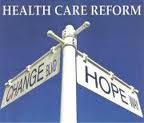
by | Jun 29, 2012
 Following the Supreme Court ruling upholding The Affordable Care Act, the financial fallout for the American people must be re-highlighted. We will have political analysis in the coming days, but for now here are the facts regarding the tax implications of this law
Following the Supreme Court ruling upholding The Affordable Care Act, the financial fallout for the American people must be re-highlighted. We will have political analysis in the coming days, but for now here are the facts regarding the tax implications of this law
Comprehensive List of Tax Hikes in Obamacare
Individual Mandate Excise Tax(Jan 2014): Starting in 2014, anyone not buying “qualifying†health insurance must pay an income surtax according to the higher of the following
|
1 Adult |
2 Adults |
3+ Adults |
| 2014 |
1% AGI/$95 |
1% AGI/$190 |
1% AGI/$285 |
| 2015 |
2% AGI/$325 |
2% AGI/$650 |
2% AGI/$975 |
| 2016 + |
2.5% AGI/$695 |
2.5% AGI/$1390 |
2.5% AGI/$2085 |
Exemptions for religious objectors, undocumented immigrants, prisoners, those earning less than the poverty line, members of Indian tribes, and hardship cases (determined by HHS)
Employer Mandate Tax(Jan 2014): If an employer does not offer health coverage, and at least one employee qualifies for a health tax credit, the employer must pay an additional non-deductible tax of $2000 for all full-time employees. This provision applies to all employers with 50 or more employees. If any employee actually receives coverage through the exchange, the penalty on the employer for that employee rises to $3000. If the employer requires a waiting period to enroll in coverage of 30-60 days, there is a $400 tax per employee ($600 if the period is 60 days or longer).
Combined score of individual and employer mandate tax penalty: $65 billion/10 years
Surtax on Investment Income ($123 billion/Jan. 2013): This increase involves the creation of a new, 3.8 percent surtax on investment income earned in households making at least $250,000 ($200,000 single). This would result in the following top tax rates on investment income
|
Capital Gains |
Dividends |
Other* |
| 2010-2012 |
15% |
15% |
35% |
| 2013+ (current law) |
23.8% |
43.4% |
43.4% |
| 2013+ (Obama budget) |
23.8% |
23.8% |
43.4% |
*Other unearned income includes (for surtax purposes) gross income from interest, annuities, royalties, net rents, and passive income in partnerships and Subchapter-S corporations. It does not include municipal bond interest or life insurance proceeds, since those do not add to gross income. It does not include active trade or business income, fair market value sales of ownership in pass-through entities, or distributions from retirement plans. The 3.8% surtax does not apply to non-resident aliens.
Excise Tax on Comprehensive Health Insurance Plans($32 bil/Jan 2018): Starting in 2018, new 40 percent excise tax on “Cadillac†health insurance plans ($10,200 single/$27,500 family). For early retirees and high-risk professions exists a higher threshold ($11,500 single/$29,450 family). CPI +1 percentage point indexed.
Hike in Medicare Payroll Tax($86.8 bil/Jan 2013): Current law and changes:
|
First $200,000 ($250,000 Married) Employer/Employee |
All Remaining Wages Employer/Employee |
| Current Law |
1.45%/1.45% 2.9% self-employed |
1.45%/1.45% 2.9% self-employed |
| Obamacare Tax Hike |
1.45%/1.45% 2.9% self-employed |
1.45%/2.35% 3.8% self-employed |
Medicine Cabinet Tax($5 bil/Jan 2011): Americans no longer able to use health savings account (HSA), flexible spending account (FSA), or health reimbursement (HRA) pre-tax dollars to purchase non-prescription, over-the-counter medicines (except insulin)
HSA Withdrawal Tax Hike($1.4 bil/Jan 2011): Increases additional tax on non-medical early withdrawals from an HSA from 10 to 20 percent, disadvantaging them relative to IRAs and other tax-advantaged accounts, which remain at 10 percent.
Flexible Spending Account Cap – aka“Special Needs Kids Taxâ€($13 bil/Jan 2013): Imposes cap of $2500 (Indexed to inflation after 2013) on FSAs (now unlimited). . There is one group of FSA owners for whom this new cap will be particularly cruel and onerous: parents of special needs children. There are thousands of families with special needs children in the United States, and many of them use FSAs to pay for special needs education. Tuition rates at one leading school that teaches special needs children in Washington, D.C. (National Child Research Center) can easily exceed $14,000 per year. Under tax rules, FSA dollars can be used to pay for this type of special needs education.
Tax on Medical Device Manufacturers($20 bil/Jan 2013): Medical device manufacturers employ 360,000 people in 6000 plants across the country. This law imposes a new 2.3% excise tax. Exemptions include items retailing for less than $100.
Raise “Haircut” for Medical Itemized Deduction from 7.5% to 10% of AGI($15.2 bil/Jan 2013): Currently, those facing high medical expenses are allowed a deduction for medical expenses to the extent that those expenses exceed 7.5 percent of adjusted gross income (AGI). The new provision imposes a threshold of 10 percent of AGI; it is waived for 65+ taxpayers in 2013-2016 only.
Tax on Indoor Tanning Services($2.7 billion/July 1, 2010): New 10 percent excise tax on Americans using indoor tanning salons
Elimination of tax deduction for employer-provided retirement Rx drug coverage in coordination with Medicare Part D($4.5 bil/Jan 2013)
Blue Cross/Blue Shield Tax Hike($0.4 bil/Jan 2010): The special tax deduction in current law for Blue Cross/Blue Shield companies would only be allowed if 85 percent or more of premium revenues are spent on clinical services
Excise Tax on Charitable Hospitals(Min$/immediate): $50,000 per hospital if they fail to meet new “community health assessment needs,” “financial assistance,” and “billing and collection” rules set by HHS
Tax on Innovator Drug Companies($22.2 bil/Jan 2010): $2.3 billion annual tax on the industry imposed relative to share of sales made that year.
Tax on Health Insurers($60.1 bil/Jan 2014): Annual tax on the industry imposed relative to health insurance premiums collected that year. The stipulation phases in gradually until 2018, and is fully-imposed on firms with $50 million in profits.
$500,000 Annual Executive Compensation Limit for Health Insurance Executives($0.6 bil/Jan 2013)
Employer Reporting of Insurance on W-2(Min$/Jan 2011): Preamble to taxing health benefits on individual tax returns.
Corporate 1099-MISC Information Reporting($17.1 bil/Jan 2012): Requires businesses to send 1099-MISC information tax forms to corporations (currently limited to individuals), a huge compliance burden for small employers
“Black liquor†tax hike(Tax hike of $23.6 billion). This is a tax increase on a type of bio-fuel.
Codification of the “economic substance doctrineâ€(Tax hike of $4.5 billion). This provision allows the IRS to disallow completely-legal tax deductions and other legal tax-minimizing plans just because the IRS deems that the action lacks “substance†and is merely intended to reduce taxes owed.

by | Jun 18, 2012
 Preparing for the Supreme Court Fallout
Preparing for the Supreme Court Fallout
With the Supreme Court ruling on the Affordable Health Care Act expected within the next two weeks, both sides of the isle are busy making contingency plans. Two things of specific note here are:
- This decision will directly affect the next session of the Iowa Legislature. As of this moment the General Assembly has delayed setting up the insurance exchanges that are required in the health care law. If the law is upheld there will be mounting pressure on Iowa Republicans to begin this process quickly, and they will be forced to decide to either design the exchanges in order to have a say in how they are built, or take no action and risk having Iowa being governed by the exchange that the Federal government constructs.
- The decision’s details will have a great impact on our health care system as it pertains to the expansion of Medicaid. The working theory is that, as long as the whole law is not thrown out, the expansion of Medicaid that would put at least 16 million new people on the Medicaid roles would remain in effect. In this scenario action by Congress would be required to reverse this new reality. This highlights the importance of Republicans winning both the Senate and the Oval Office in November, regardless of the Supreme Court ruling.
    New York Times: With Justices Set to Rule on Health Law, Two Parties Strategize
An Early Analysis of Iowa in November
Take a look at the infrastructure the Obama and Romney campaigns are building in Iowa, and some of the factors at play in a crucial swing state.
Among some of the interesting things dealt with here are how having Steve King and the judicial retention elections on the November ballot will affect the Presidential race.
Slate: The Psychological State of IowaÂ
A Disturbing Sign of the Times
One wonders how long our Country can prosper while producing citizens capable of the following behavior–and having a social safety net that makes it possible.
Unbelievable and Despicable:Â News Channel 3 (Memphis): Memphis Man Owes Child Support to 15 Women
Even More Unbelievable and Despicable:Â News Channel 3 (Memphis):Â Tenn. Man “Fathers” 30 Kids But Can’t Support AnyÂ

by | May 17, 2012
 With the primary and caucus season officially over, the time for Iowa Republicans to come together has now arrived. For Republicans in Ankeny and the surrounding areas, literally getting together will be on the menu Saturday May 26th at the Ankeny Band Shell in Wagner Park—along with some world-class barbeque.
With the primary and caucus season officially over, the time for Iowa Republicans to come together has now arrived. For Republicans in Ankeny and the surrounding areas, literally getting together will be on the menu Saturday May 26th at the Ankeny Band Shell in Wagner Park—along with some world-class barbeque.
The event is the first annual “Senator Whitver Memorial Day Weekend Picnic,†and it will feature some great guests. Among those speaking will be Governor Terry Branstad, Congressman Tom Latham, and Secretary of State Matt Schultz.
For Senator Whitver the idea of having a picnic was the perfect way to bridge two good causes, “There is such a feeling of community in Ankeny and I wanted to start an event that can be an annual tradition. Being a young father myself, it is important to me that this is a family friendly event. This will be a great chance for kids to meet and speak with their elected officials, including the Governor, and a great opportunity to teach them the importance of being involved.â€Â The other good cause is that all funds raised will go to support Senate Republicans this November. To this point Senator Whitver added, “This is also an event that will help Republican candidates all over the state and help us take the majority in the Iowa Senate next fall.â€
Besides hearing from the featured guests, Ankeny residents will have the chance to meet the candidates running to represent them in the Iowa House, as well as Polk County Sheriff candidate Dan Charleston.   There will be plenty of food and entertainment throughout, as all attendees will be treated to live music and the cooking of renowned Iowa barbeque chef Lee Booton.
Against the family picnic backdrop, political enthusiasts will have plenty to keep an eye on as well. This will be one of Governor Branstad’s first public appearances following the adjourning of the Iowa Legislature, and many will likely be hearing from Congressman Latham for the first time since launching his campaign in a very high profile showdown with Representative Leonard Boswell. Returning to Ankeny after speaking at the Polk County Convention in March, Mr. Latham sounds ready to meet and speak with voters in a far more casual setting. When asked for his thoughts on this upcoming Republican get together he responded, “I am looking forward to this great event and an afternoon of seeing old friends and making new ones.”
In the big picture, the influence that Iowa has in the primary process will be fully re-lived this November. As an unquestioned swing state in the presidential election and home to two of the most important Congressional races in the Country, what happens here will undoubtedly re-shape American politics for the next several years.
All those interested in shaping what will become an Ankeny tradition for several years to come should take a look at the flyer below and make plans to attend on Saturday, May 26th. If you are sure to attend, please RSVP to [email protected]. Tickets will also be available for purchase the day of the event.
 

by | May 14, 2012
 In a wildly under-reported story, last Monday the Des Moines Register uncovered a shocking fact—Leonard Boswell is a blue dog Democrat.
In a wildly under-reported story, last Monday the Des Moines Register uncovered a shocking fact—Leonard Boswell is a blue dog Democrat.
To anyone paying attention to politics, and familiar with Mr. Boswell’s votes during his last term, this certainly comes as quite the revelation. The front page headline was written by Jennifer Jacobs and titled “Opinions vary on effectiveness of Blue Dog democrat Boswellâ€.
I am far less interested in the article itself than I am in the fact-like pronouncement that Leonard Boswell, especially recently, fits in the “blue dog†pack. Though he is officially a member of a group of U.S House members called the “Blue Dog Coalitionâ€, his voting record puts him so clearly opposite of nearly every one of this coalition’s mission statements that it’s truly laughable.
We will look at the record in a second, but let me first say that this is not the only time the Des Moines Register has been called out here—and technically it could happen almost daily. The reason this headline catches the eye is that with election season underway, characterizations and even subtle hints can go a long way in influence uninformed voters in November. Especially if advertising Boswell as someone who has been tight with the purse strings becomes a campaign strategy, which would be smart politics, this is a notion that has to be quickly and forcefully refuted.
The bottom line is that Leonard Boswell can call himself whatever he wants, and the Register can shrug off critical thinking and follow suit— but that doesn’t make it true. The fact is that if he is a blue dog, then Steve King is socially moderate and Kim Pearson and Tom Shaw “go along to get alongâ€. Let’s dig in…
Blue Dogs
For those unaware, a blue dog Democrat is a legislator in the House who is fiscally conservative and philosophically breaks with their party on the level of government spending and taxation that is appropriate, and by their own definition even moral. Though they recently are trying to branch out into other issues like energy and economic growth, by and large their purpose is to oppose overspending and battle fellow Democrats when need be. This being the case you would expect to see some sort of opposition from “blue dog†Leonard Boswell to the direction the Country has swerved in following President Obama’s election. Instead, in the last three and a half years the national debt has increased $5 trillion dollars—and Mr. Boswell has cast “yea†votes all along the way. Here is the record.
The Record
The following are key votes the Congressman has taken on major tax and spend issues since 2009.
Voted in favor:
• Economic Stimulus Bill—over $800 billion added to the national debt, more than a trillion dollars with interest included (passed the House 246-183 on Feb. 13, 2009).
• Obamacare—price tag of $900 billion over 10 years at passage, most recent CBO scoring nearly doubled this amount to $1.76 trillion (passed the House 219-212 on March 21, 2010).
• Cash For Clunkers –cost of nearly $3 billion (passed the House 316-109 on July 31, 2009).
• Extending Unemployment Benefits—April 15, 2010 (passed 289-112), May 28, 2010 (passed 215-204), and July 22, 2010 (passed 272-152).
• Raising the debt ceiling—passed the House 218-214 on December 16, 2009.
• Cap and Trade—according to the Obama administration itself, would have cost Americans up to $200 billion a year (passed the House 219-212 on June 26, 2009).
Voted against:
• Cut, Cap, and Balance—passed the House 234-190 on July 19th, 2011
• Debt ceiling bill – This is the John Boehner version that would have raised the debt ceiling in exchange for limits on discretionary spending (passed the House 218-210 on July 29, 2011).
• Reducing spending to F.Y 2008 levels—passed the House 256-165 on July 25, 2011.
One can make many claims about Boswell’s last term in Congress, but given this record it is hard to imagine how any fair-minded person could call him fiscally conservative. Besides the unbelievable amount of money he voted to add to our national debt, the other thing to note is how close many of these votes were. In particular, the Obamacare and Cap and Trade votes authorized borrowing hundreds of billions of dollars per year—and passed by a combined 14 votes. If there ever was a time a blue dog would stand up for their principles of responsible spending it would have been then.
Why It Matters
To bolster the claim that he is a centrist, the Register story uses a National Journal analysis of his votes in 2011 (right before an election year) which places him more liberal than 61.8% and more conservative than 38.2% of his fellow House members. While this point is highly arguable, any description of him as concerned with deficits and high taxes cannot be made with a straight face. In our current political climate of outrage over debt, the failure of the Stimulus Bill, and the GSO and Solyndra scandals, any distancing of himself from these issues would be a huge re-election asset—and one he clearly has not earned.
What is really ironic here is the fact that this story follows a weekend in which the Des Moines Register published a piece telling their readers that they would soon be charging for online access to much of their content. This transition has many affiliated with the paper very nervous, as there is a high probability of it being a disaster. As long as they continue doing things like allowing Democratic politicians to self-identify themselves without publicly asking questions like “is Leonard Boswell truly a blue dog?â€â€”not only will their bottom line struggle…they will struggle to remain in operation.

by | May 9, 2012
 After failing to reach a compromise on tax reform for the second consecutive session, today the Iowa Legislature adjourned until next year. In the end the Governor-backed House proposal on property tax reform failed to even see a vote in the Senate, as Senator Gronstal refused to bring it to the floor.
After failing to reach a compromise on tax reform for the second consecutive session, today the Iowa Legislature adjourned until next year. In the end the Governor-backed House proposal on property tax reform failed to even see a vote in the Senate, as Senator Gronstal refused to bring it to the floor.
We will have analysis on this in the coming days, but my gut tells me that privately many Republicans, especially those in the 2010 crew, are more than willing to gamble on a majority in the Iowa Senate after November. This is not to say that they did not want to put something on the books this session, but there are multiple reasons why this conclusion was advantageous.
First, considering the alternative, the optics couldn’t of turned out much better. Some in the Republican caucus had even publicly hinted that not getting a deal may be the best deal, and if they had pushed walking away from the session a week ago it could have easily been pinned on them. Instead the way it ended, with the Senate majority leader failing to bring up the already passed House bill, Democrats were left holding the bag–and the blame. Making matters worse for Gronstal and company is the fact that they lost two Democrats in the final vote on the Senate version, which means their own plan did not even pass the Democrat controlled Senate.  With the House passing a tax reform plan that the Senate chose not only to ignore, but to ignore in favor of holding a losing vote on their own plan, there is almost no way for this to be spun as a Republican inspired log-jam.
Second, from a strictly long-term strategic viewpoint, Republicans waiting till after November is also a win-win.  The reason for this is simple. There is no policy downside in waiting till next session because, even if Republicans fail to take the majority in the Senate, there is absolutely no way the Democrats will put a smaller tax reduction plan on the table next session.  They have already staked out their ground politically on this issue and they can only agree to either the same level of cuts or more cuts than they proposed this session. Can you imagine what would happen if they came back next session and put an offer on the table of less tax relief?…point made.  The upside for Republicans however is potentially huge–a majority, in which case they would get what they had on the table this session, and probably then some.
There is certainly more to come on the session wrap in the near future, including Republican reaction, but for the time being below is the full text of Governor Branstad’s official statement on the end of the 2012 session.
************************************************************************************************************
In January, the lieutenant governor and I brought forward a bold agenda focused on the dual goals of job creation and transformational education reform. I want to thank the General Assembly for considering our priorities and for adopting a significant number of them to help move our state forward. [See list below.]
Legislation passed by this General Assembly will provide our Iowa Economic Development Authority with additional tools to help meet our administration’s ambitious goal to create 200,000 new jobs. We have made significant progress on that goal during this first year and a half and the High Quality Jobs Incentive Fund and Employee Stock Option Plan legislation will help accelerate those efforts.
I am also pleased that this General Assembly took a first important step toward our goal of transformational education reform. While these initial steps may be considered by some as small, our new early childhood literacy initiative, in particular, will have lasting effects on the lives of thousands of Iowa children and significantly improve their chances of future academic and career success. We also enhance teacher accountability by requiring annual reviews.
However, the 2012 session may be remembered as much for what failed to be accomplished as for what actually was accomplished. Despite the best efforts of my office and a bipartisan majority in the Iowa House, the inability of Senate Democrats to adopt serious property tax reform has put Iowa taxpayers in jeopardy of seeing significant property tax increases in the coming year.
The Senate failed to support legislation based on the framework I believe was agreed to as a roadmap to finding a compromise between my office, the House, and the Senate. They failed to pass a meaningful step forward in our goal to make Iowa’s tax system more competitive or assist with our critically needed job creation goals.
As a result, Iowa taxpayers face yet another year with property taxes that are scheduled to grow nearly $2 billion over the next eight years. This is absolutely unacceptable and Iowa voters will have an opportunity to resolve this impasse in November.
Lt. Governor Reynolds and I are proud to work with all members of the Iowa General Assembly and proud to serve our citizens each and every day.  We will continue over the next seven and a half months of 2012 to travel the state, promote our ambitious agenda, and work aggressively toward the achievement of our four goals:
1.     200,000 new jobs for Iowans;
2.     25% increase in personal incomes;
3.     Reduce the cost of government by 15%; and
4.     Provide our children with the nation’s finest education.

by | Apr 25, 2012
 Last night’s Polk County Central Committee meeting was a harbinger for both good and bad things to come for the future of Republicans in Polk County.
Last night’s Polk County Central Committee meeting was a harbinger for both good and bad things to come for the future of Republicans in Polk County.
The Highlights
Among the several speakers to address the committee were Polk County Sheriff candidate Dan Charleston and Senator Rick Bertrand (pictured at right). Charleston has been very active in his attempt to unseat his boss Bill McCarthy, who has once again doubled down on his support for spreading controversial traffic cameras throughout Iowa. His bid to remove McCarthy will not be easy, however, this is an outcome that becomes more possible with McCarthy supporting a hot-button policy that the majority of Iowans reject. While Conservatives throughout Polk County will be rightly focused on state and Congressional seats in the coming months, it would be a mistake to ignore this race for sheriff. It can be easily argued that the performance and priorities of law enforcement has an equal impact on citizens at the County level as legislative seats. All Conservatives who are unaware of this race would be well advised to visit Dan Charleston’s website, were he lays out his positions on several issues (including traffic cameras and illegal immigration). It is safe to say he would bring a far different mindset to the job–and there is much to like.
While Senator Rick Bertrand was not on the agenda to speak, all in attendance were glad he made the trip. Speaking for nearly 20 minutes, he got fired up covering topics ranging from his background, his victory in a legal slander case against Iowa Democrats, and the future agenda of Senate Republicans.
Beyond being a gifted and enthusiastic speaker, the real positive to take away from his presence in the Iowa Senate is his potential to bridge the divides that have recently been created by the emergence of a more Libertarian brand of Republican in the party. I have asked him personally about the prospects of real legislative results from the Conservative movement in the Iowa Legislature–and I assure you he has a plan and will be front and center in achieving it. In my view, he is one of a handful of current Republican legislators who can effortlessly bridge the gap between the old and new guards in the Republican Party. In the coming months The Conservative Reader:Iowa will be laying out exactly what this 7 issue action plan is, and will be looking at each in detail.
The Low-Lights
Having been in attendance at the last two Central Committee meetings, there is little doubt left that the drama surrounding last month’s meeting is not going away. The divide between Chairman McLaughlin (along with other members of the leadership), and co-chair Dave Funk is quickly approaching critical mass. Several times during the meeting there was open bickering and contention between the two. This was taking place not in the side or back during down time, but actually during the meeting and at the front of the room.
As of this time I am not taking sides. Far more important than taking sides is finding some way for this strained situation to be resolved. Besides risking several political objects that are certainly within reach, this feud is simply embarrassing for all of the new folks who have been energized during the caucus and have made the time consuming decision to get involved. At this rate the attendance of these meetings will swell only on the grounds of voyeurism, as people will start coming to view a live version of the Jerry Springer Show. Finding a way to make these meetings a little less bland would be a more than worthy endeavor, however, this is not exactly what I had in mind.
Looking Forward
I will be in attendance at the next meeting, if it is plagued by these same issues than the report you read here following it will be of a far different tone. At that point critical mass will have unquestionably been reached and a movement to action will have to be initiated. With so much crucial work to be done in the coming months, continuing in this manner is simply not an option.

 Following the Supreme Court ruling upholding The Affordable Care Act, the financial fallout for the American people must be re-highlighted. We will have political analysis in the coming days, but for now here are the facts regarding the tax implications of this law
Following the Supreme Court ruling upholding The Affordable Care Act, the financial fallout for the American people must be re-highlighted. We will have political analysis in the coming days, but for now here are the facts regarding the tax implications of this law









